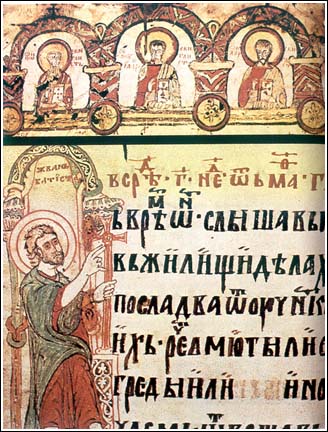 Miroslavs Gospel, one of the oldest surviving documents in Church Slavonic. (U.S. pulic domain)
Miroslavs Gospel, one of the oldest surviving documents in Church Slavonic. (U.S. pulic domain)
Here is information taken from the website of the Orthodox Electronic Publishing Society about Church Slavonic, and the patron saints of Slavic cultural heritage, Cyril and Methodius.
* * *
Church Slavonic is a rich and vibrant part of our Orthodox heritage. This liturgical language is not simply a remnant of our Orthodox past but part of the very fabric of our communal worship of God today. All Slavic Orthodox Churches were influenced by Slavonic. Our rich hymnography and music are imbued with its rhythm and meter. While English translations and musical arrangements have made huge strides in conforming to traditional Orthodox style, rarely do they approach Slavonic's spiritual majesty and splendor.
Although Slavonic is far from extinct in its usage, there is a natural pressure in America to use English in the Divine Services. English speaking converts and even many "cradle Orthodox ", immigrants and American-born alike, have little understanding of Church Slavonic. Having spent my youth hearing Slavonic every Sunday, it is only now in adulthood, and some twenty years away from the Church, that I finally have come to understand the Divine Services after participating in services in English. Early in my return to the Church I found myself constantly saying "oh... this is what that means" as I regularly discovered something new in the services. Like it or not, services in English are crucial to bringing American Orthodox in step with traditional Orthodoxy. However, it would be a great tragedy for us to loose touch with this fundamental part of our spiritual heritage.
In reality few of us have the time, motivation, nor perhaps the ability to assimilate a new language, particularly one as esoteric as Slavonic. Yet, some might welcome the chance to learn a prayer or two in Slavonic. The Church Slavonic E-Tutor was developed with this in mind. Its purpose is to help make Slavonic more accessible and, God willing, promote interest in preserving its usage.
History
Saints Cyril and Methodius were missionaries and linguists, known as the "Apostles to the Slavs". They were brothers and members of a noble family of Thessaloniki. St. Cyril (actually known as Constantine until shortly before his death when he was tonsured a monk) was librarian of the great cathedral of Hagia Sophia in Constantinople until 860, when he resigned to join St. Methodius, the abbot of a Greek monastery, in missionary journeys to the Khazars and the Bulgarians.
In 862, Emperor Michael III sent them to Moravia, where they taught and celebrated the liturgy in the Slavonic vernacular, now known as Old Church Slavonic. To translate the Bible into this previously unwritten language, the brothers constructed a script for Slavonic known today as glagolithic. Glagolithic is considered by some as the precursor of Cyrillic. The Cyrillic alphabet used in modern Slavic languages is often attributed to St. Cyril, but it was probably the work of his followers.
St. Cyril died in Rome, where the brothers had gone to defend themselves against German leaders who wanted to enforce the use of the Latin liturgy among the Slavs. St. Methodius was consecrated an archbishop and later returned to Moravia as a papal legate.
The Church celebrates their memory on May 11 O.S./ May 24 N.S .
A Few Words About This Program
This project has been undertaken with the humble intent of helping those interested in learning Slavonic. It does not purport to be an authoritative resource. As always, it is best to consult one's Spiritual Father or priest before undertaking the study and use of Slavonic in one's prayer life.
Peter Serko



